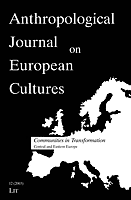Zerimonielle und alltägliche Konsumpraktiken auf dem tschechischen und polnischen Land: Modernität durch die verändernden Essgewohnheiten begreifen
Ritual and Everyday Consumption Practices in the Czech and Polish Countryside: Conceiving Modernity through Changing Food Regimes
Author(s): Haldis HaukanesSubject(s): Cultural Essay, Political Essay, Societal Essay
Published by: LIT Verlag
Keywords: consumption; domestic economy; food; gender; local identity; marriage; modernity; Konsum; lokale Identität; Hochzeit; Modernität;
Summary/Abstract: In this article we consider various changing consumption practices in the Czech and Polish countryside, and look at ways in which practices – local, domestic and individual - are affected by or shift in relation both changes in wider political economy, a esthetics and style, and information and knowledge technologies. We are particularly interested in ways local preparation and consumption of food may reflect and hence give us insight into ideas and ideologies of tradition and modernity. We argue that at least in some contexts the end of communism has meant a shift in understanding of the modern, or of what it means to be modern, particularly in relation to the family, local identity or belonging, and the nation. We focus particularly on food and consumption as they epitomize changing under standings of what constitutes traditional and modern a esthetics and practices, and argue that we can best understand the interconnections between them through an examination of the way that these have an impact on, or a replay edout in relation to, everyday life and periodic ritual detail. In the article we raise questions about the connections which exist, across historical periods, between ideologies of modernity and tradition (or what might be called neo-traditionalism) and about the disjuncture between them: what does it mean to leave behind the practices that developed during fifty years of socialist planning and the concurrent socialist constructions of a particular type of modernity? We focus on individuals and families, and look at food, gender and consumption in the specific contexts of weddings, and wedding ritual, and of daily diet and national cuisine, in order to consider the making of gendered bodies and national meaning through food. In each context, we ask how notions of modernity and tradition a reelicited, constructed and contested in relation to food.
Journal: Anthropological Journal on European Cultures AJEC
- Issue Year: 2004
- Issue No: 12
- Page Range: 103-130
- Page Count: 28
- Language: English
- Content File-PDF

